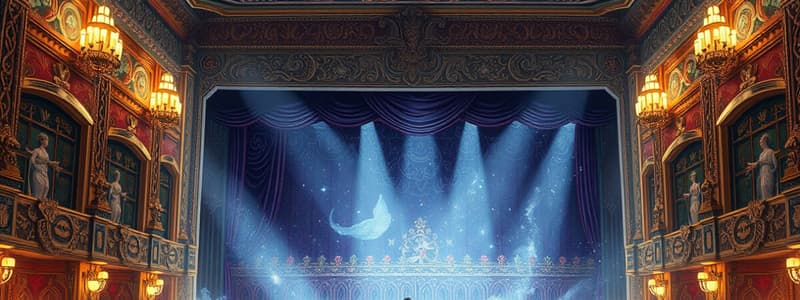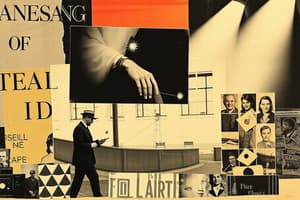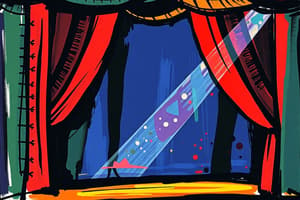Podcast
Questions and Answers
What are the two categories of theatre?
What are the two categories of theatre?
- Plays without music (correct)
- Operetta
- Plays with music (correct)
- Musical Comedy
What is an opera?
What is an opera?
A drama that is set entirely to music; all the lines are sung.
What distinguishes an operetta from a grand opera?
What distinguishes an operetta from a grand opera?
It has a frivolous, comic theme and some spoken dialogue.
What characterizes a musical comedy?
What characterizes a musical comedy?
What is a rock musical?
What is a rock musical?
What is a revue?
What is a revue?
What is one of the primary functions of a comedy number in musicals?
What is one of the primary functions of a comedy number in musicals?
What does the term 'showstopper' refer to?
What does the term 'showstopper' refer to?
What is the function of an overture in a musical?
What is the function of an overture in a musical?
What is the definition of a ballad?
What is the definition of a ballad?
What is included in the forms of plays with music?
What is included in the forms of plays with music?
Which of the following best describes the musical 'Showboat'?
Which of the following best describes the musical 'Showboat'?
What is a 'reprise' in musicals?
What is a 'reprise' in musicals?
The first modern musical in the United States was 'The Black Crook'.
The first modern musical in the United States was 'The Black Crook'.
What does a 'book musical' imply?
What does a 'book musical' imply?
What is the significant historical aspect of minstrel shows?
What is the significant historical aspect of minstrel shows?
What are the components of a musical's structure?
What are the components of a musical's structure?
What impact did World War I have on musical comedies?
What impact did World War I have on musical comedies?
What are the two decades considered the golden age of great American musicals?
What are the two decades considered the golden age of great American musicals?
What characterizes today's musicals?
What characterizes today's musicals?
Flashcards are hidden until you start studying
Study Notes
Categories of Theatre
- Two main categories: plays with music and straight plays (plays without music).
Types of Musical Theatre
- Opera: Entirely sung, typically set to classical music. Originated in the late 1500s during the Italian Renaissance.
- Operetta: Light opera featuring comic themes, spoken dialogue, and some dancing.
- Musical Comedy: Light-hearted, fast-paced stories with dialogue interspersed with popular music.
- Straight Musical: Focuses on serious plots and themes.
- Rock Musical: Incorporates rock music from the 50s to contemporary pop.
- Revue: A collection of satirical sketches, songs, and dances centered around a theme.
- Variety Show: Unrelated acts of singing, dancing, and comedy, evolving from vaudeville.
- Vaudeville: Popular stage entertainment from the 1880s to the 1940s, featuring a variety of acts.
- Burlesque: Musical entertainment originating in the 1840s, characterized by bawdy songs and skits.
Structure of Musical Theatre
- Components include music (by the composer), lyrics (by the lyricist), and books (spoken dialogue by the librettist).
- Differentiations include book musicals (well-developed stories), dance musicals (featuring choreography), and operatic musicals (mostly sung with little dialogue).
Musical Terminology
- Overture: A preview medley of the show's songs.
- Ballad: A love song.
- Comedy Number: Provides comic relief within the musical.
- Showstopper: A notable big production number.
- Reprise: Repetition of a song with new or altered lyrics to make a dramatic point.
Historical Development of Musical Theatre
- American Invention: Musical theatre in America merged various traditions from other cultures.
- The Black Crook (1866): Considered the first modern American musical; a financial success that lacked strong narrative depth.
- African American Musicals: Early works like A Trip to Coontown (1898) laid the foundation for future contributions by African Americans in musical theatre.
- World War I: The musical comedy genre thrived with composers like George M. Cohan and Irving Berlin shaping Broadway.
- Showboat (1927): A landmark production that combined musical comedy with serious storytelling, changing the landscape of American musicals.
Key Musicals and Their Impact
- Oklahoma! (1943): Integrated serious themes into musicals, featuring well-developed characters.
- West Side Story (1957): A modern retelling of Shakespeare’s Romeo and Juliet, showcasing Broadway's evolution.
- Cabaret (1966): Addressed cultural issues in pre-Nazi Germany.
- Hair (1967): Introduced rock music and themes of counterculture to the musical format.
Contemporary Context
- The rise of Bollywood has shifted the center of musical production and popularity from the U.S. to India.
- U.S. musicals face high production costs, leading to a trend of revivals and adaptations from Hollywood movies.
- Successful recent musicals include Mamma Mia! (2001) and Jersey Boys (2005), demonstrating the genre's evolution.
Current Trends
- A diverse range of musicals now exists to cater to various audiences, including modern rock musicals and classic revivals.
- Despite financial challenges, American musical theatre continues to innovate and adapt to contemporary tastes and influences.
Studying That Suits You
Use AI to generate personalized quizzes and flashcards to suit your learning preferences.




